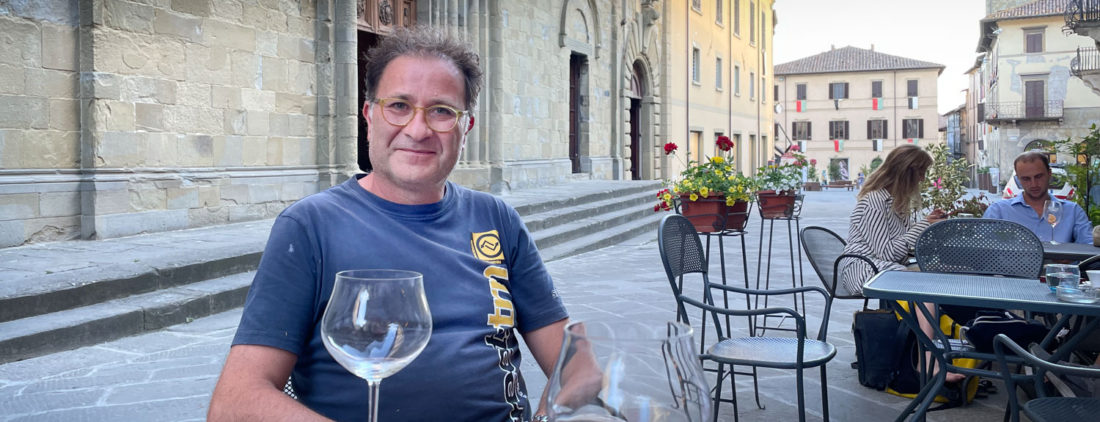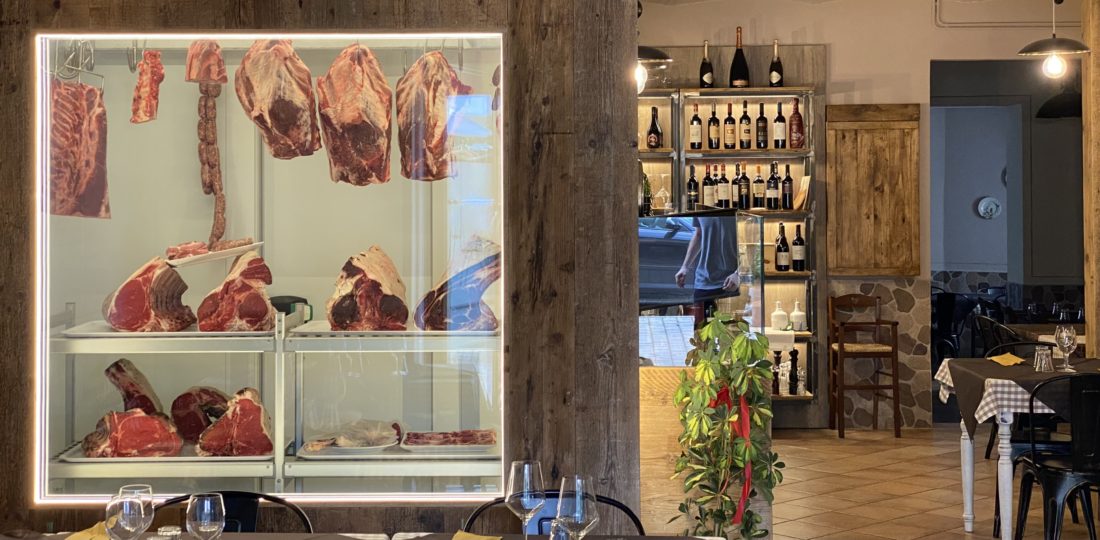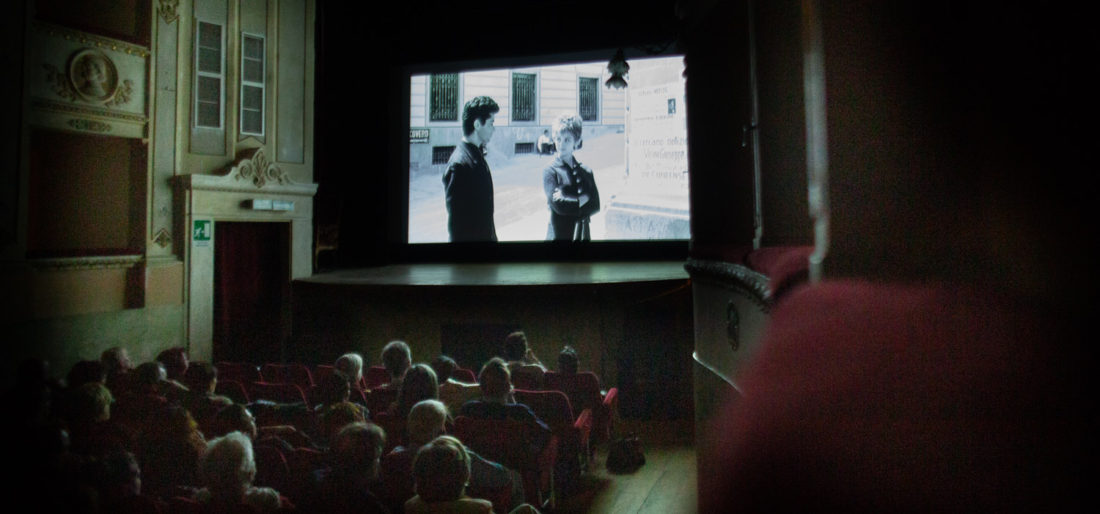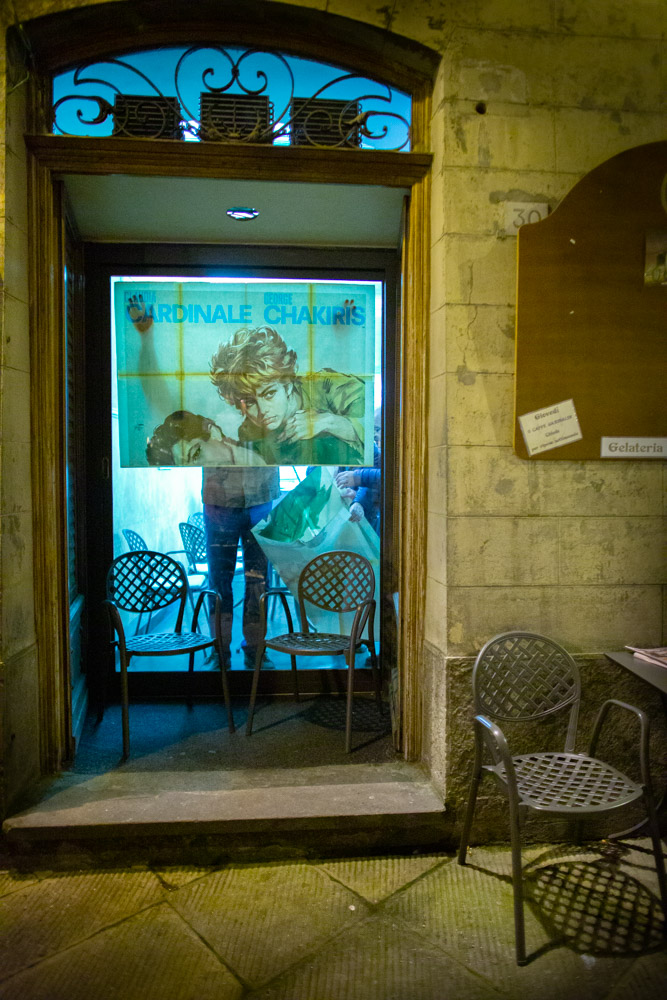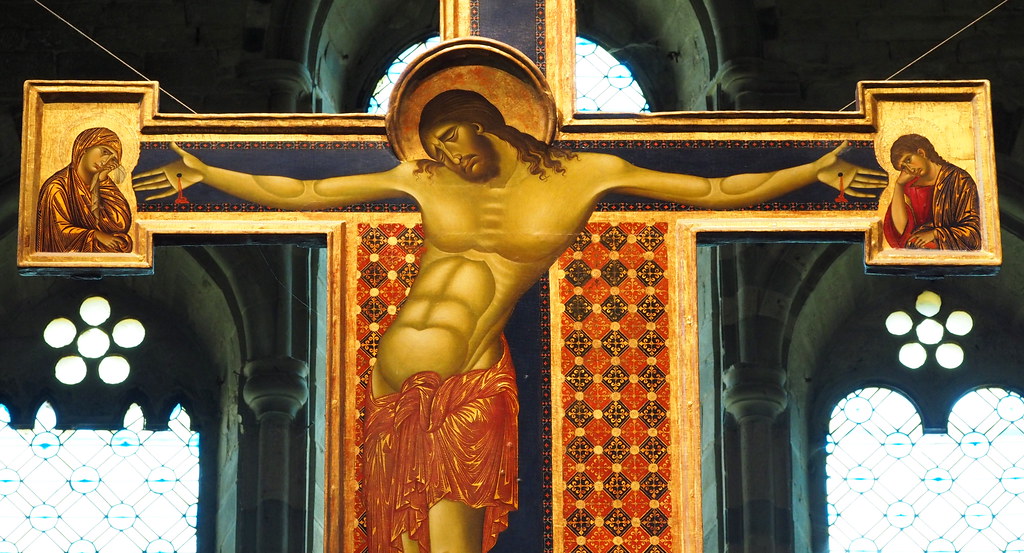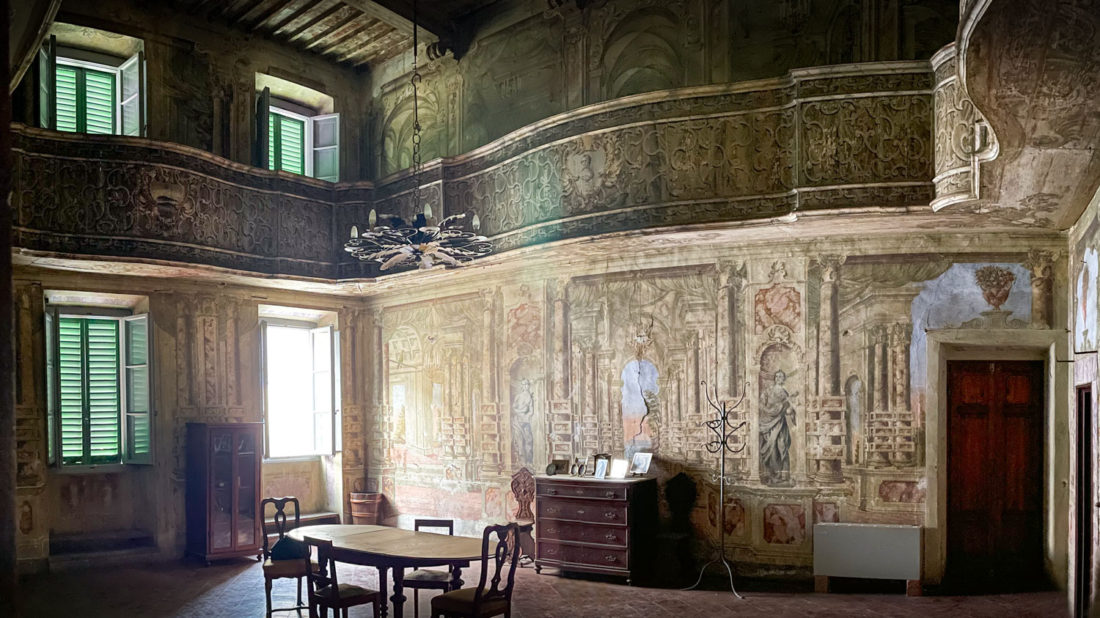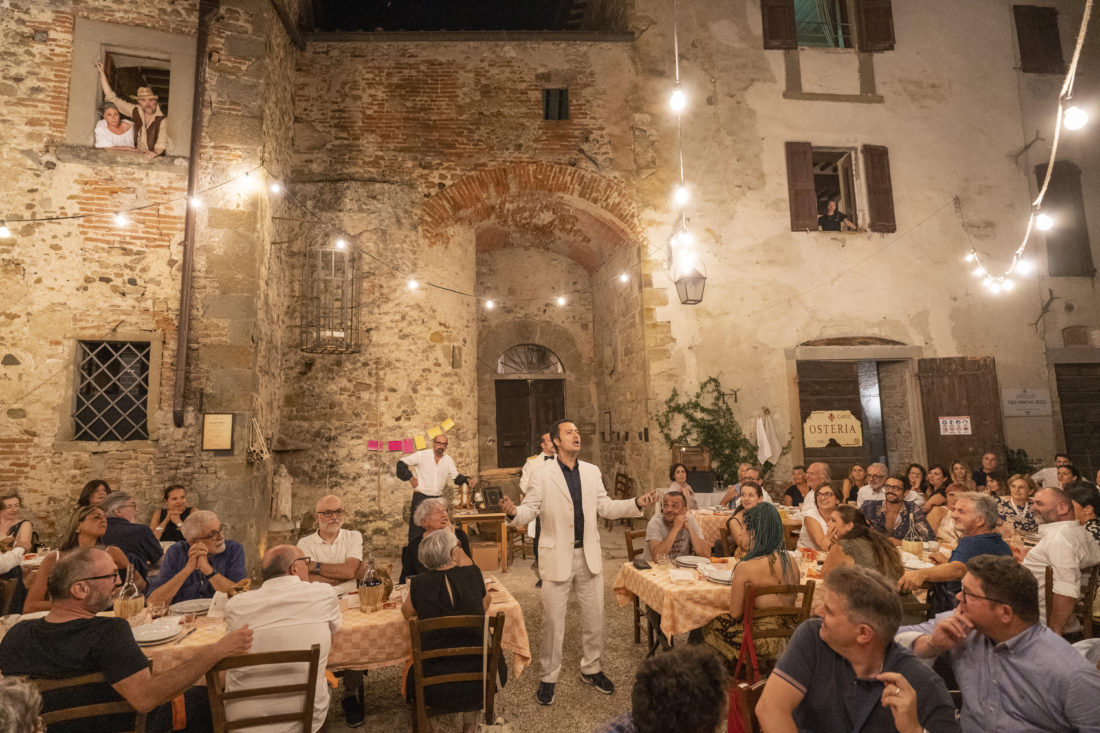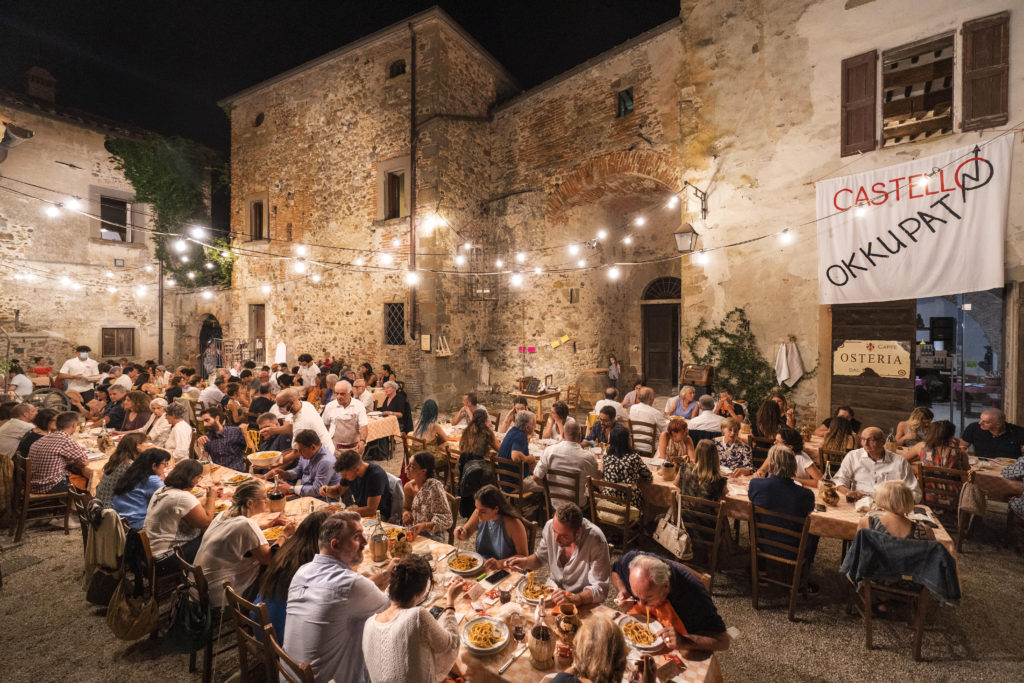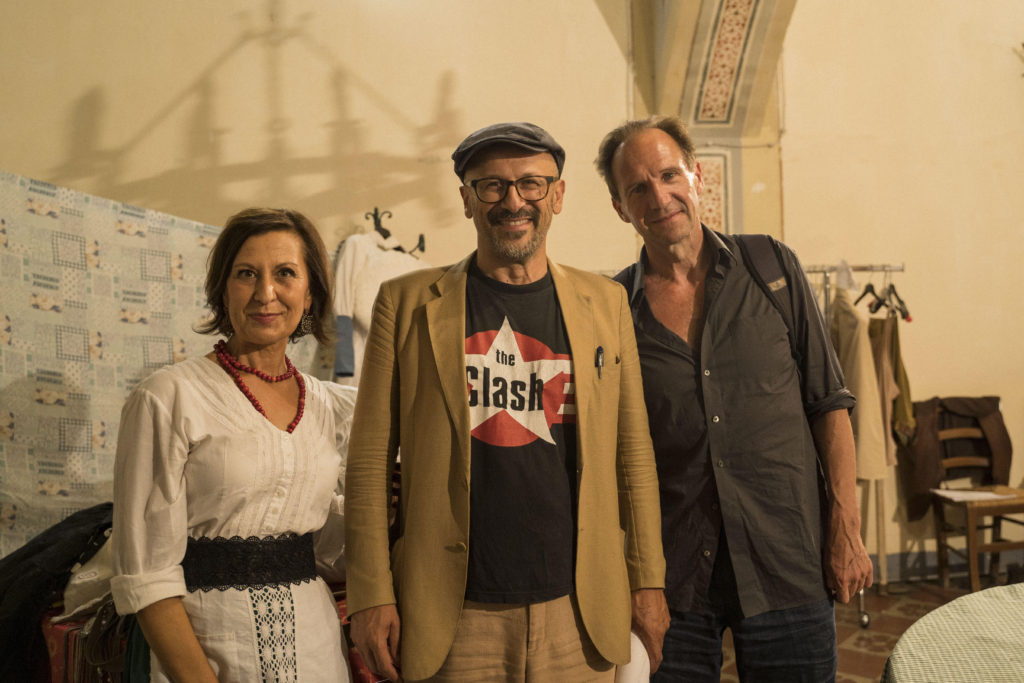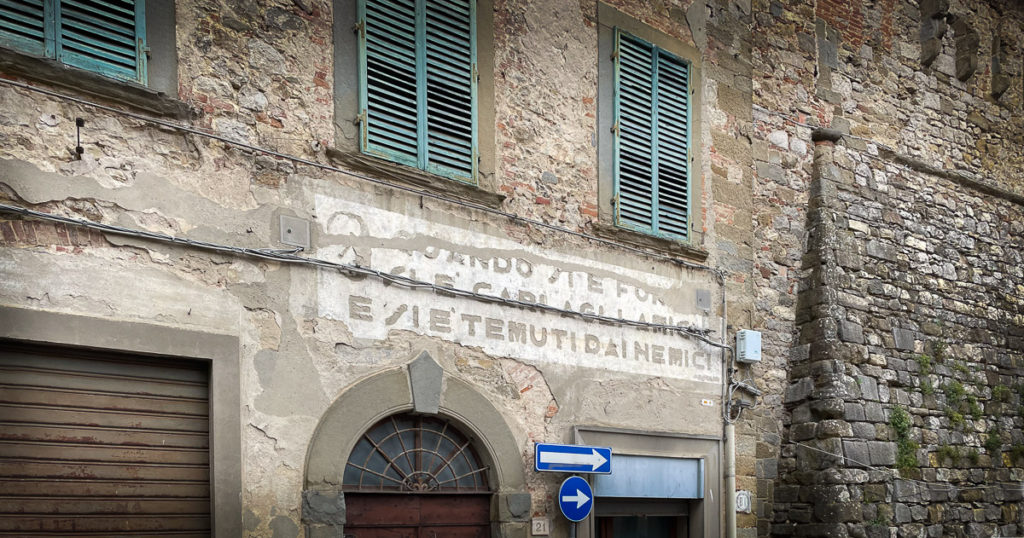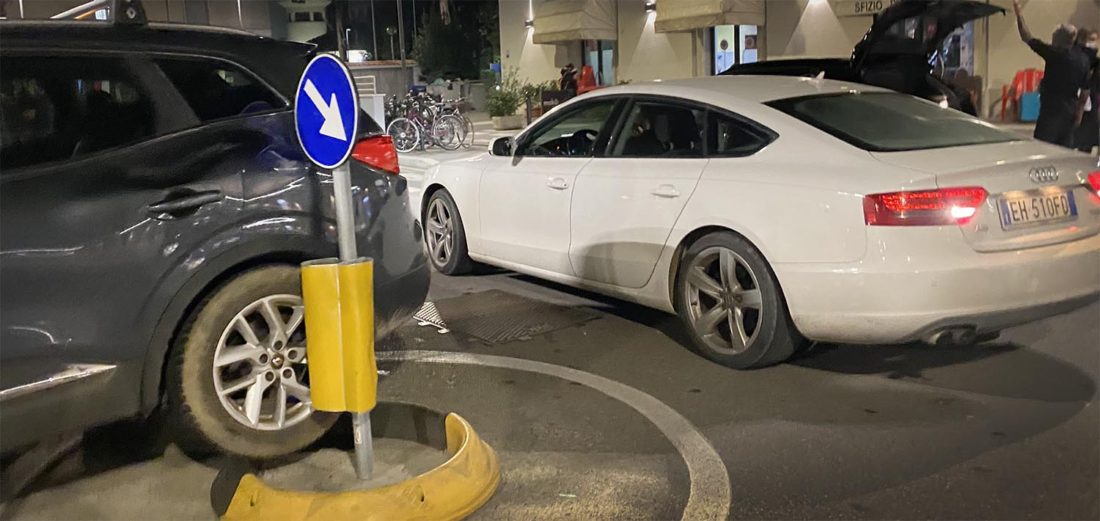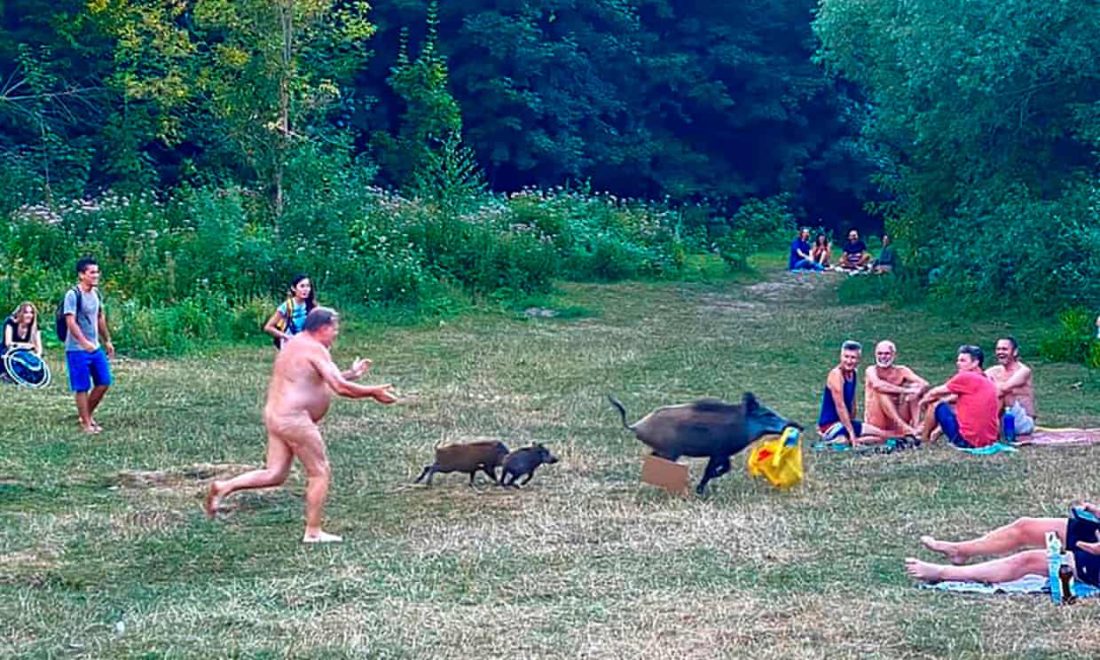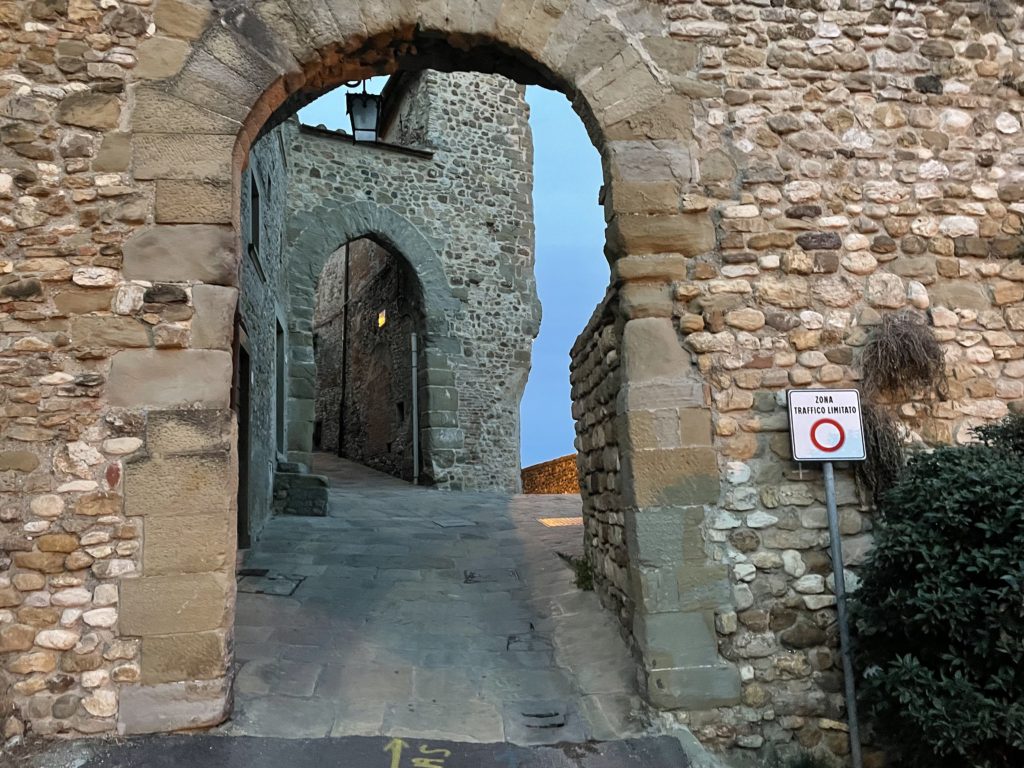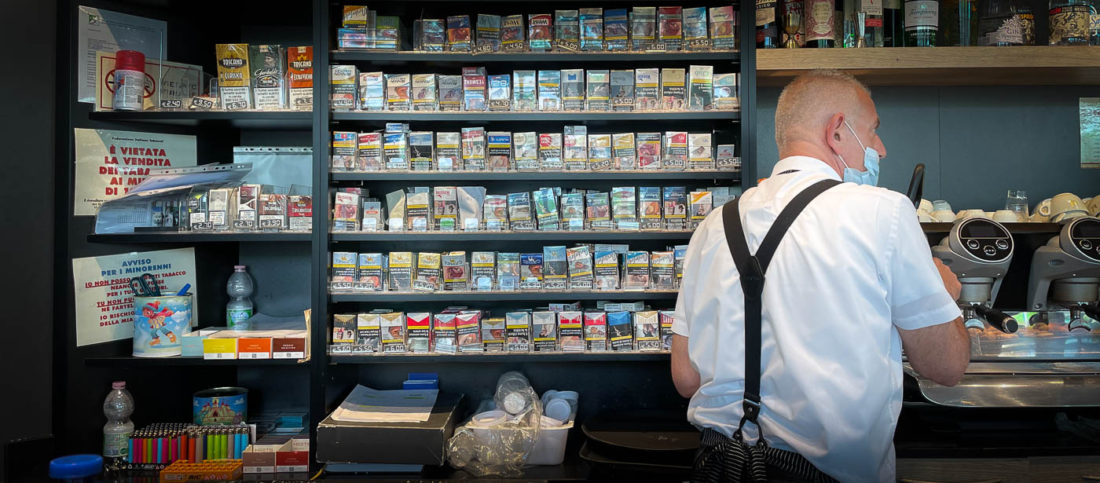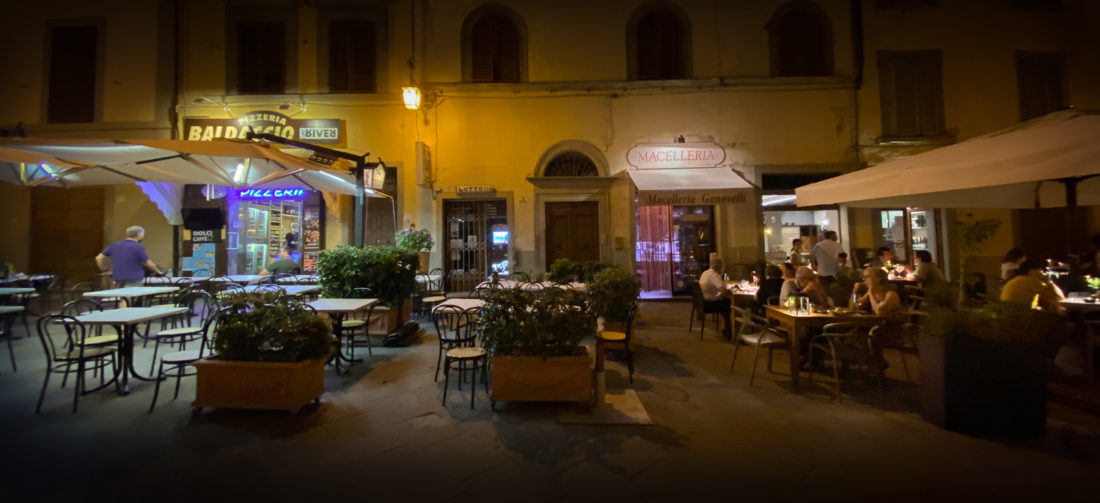January 23, 2022
In
Best Of, Live
By
Nancy
Descriptions of modern high-end houses often brag about having a private theater where one can gather with friends and watch a movie. Starting in the Renaissance, wealthy Italian home builders also had the desire to share entertainment with their friends, but instead of small screening room they built actual theaters in their houses, sometimes including stages with sets, an orchestra pit, and box seats, so they could host theatrical productions or operas in the comfort of their own homes. Or, uh, palaces. Even our small village of around 6,000 people used to have six different private theaters, and recently I did a walking tour that visited them all.
The most mysterious one of them (pictured above) was one I’d only heard about only once or twice over the ten years we’ve been here. When we were looking for a house to buy a couple of people asked if we’d seen the place for sale with the theater, right in the middle of town. A friend said she was walking around the rundown rooms and she opened a door that she thought was to a closet and BOOM, there she was, in the middle of a private theater. Seemed kind of too good to be true, but we couldn’t find anyone to show it to us and when we finally saw plans of it we reached the same conclusion that friends had—the layout was very difficult to convert into a house. So when I had the chance to see this place on the tour I jumped. It’s on the main floor on a smallish palazzo on the distinctive steep, straight street of town that descends and then crossed the valley in a perfect line. Inaugurated at the beginning of the 18th century, The Ulivi Stefanelli Palace theater is pretty humble. It was designed for a standing audience and has its backdrops painted into the walls instead of changeable, but the backgrounds are full of perspectives where your gaze loses itself in the search of imaginary places dotted with bizarre and fantastic characters. It has a petite balcony surrounding it where guests could watch from a different angle.

Today, the old palazzo has been divided into flats so the main floor now holds the theater, a couple of other rooms that could be used as bedrooms, a place that could be a kitchen, and a back garden. (Apparently the floor above is also for sale which could make it much more liveable.) And yes, it is for sale if your home owning dreams include your own spettacolo.
This desire to see a mysterious piece of real estate in the village made me curious about theaters in Italy. Turns out that Italians invented theaters as we know them, as well as some of the widely-credited art forms that are still performed in them, like opera and the Commedia dell’arte.
Theaters started to boom in Italy during the Renaissance as the passion for perspective that was taking over painting naturally extended to backdrops for performances, setting the stage (OK, I will stop) for a flood of innovation as they brought their theories into this three-dimensional space.
The first permanent modern interior theater, the Teatro Olimpico, was designed by Palladio and is still in existence in Vicenza, near Venice. Opened in 1585, the theater has an elliptical shape with tiered seats so everyone could see and hear well. The design was a reflection of Palladio’s love of Roman antiquities.

The scenery could not be changed, but the set incorporated the latest thinking about perspective and vanishing points, emphasized by a tilted floor to force perspective. Every seat was aligned to marvel at one of these views.
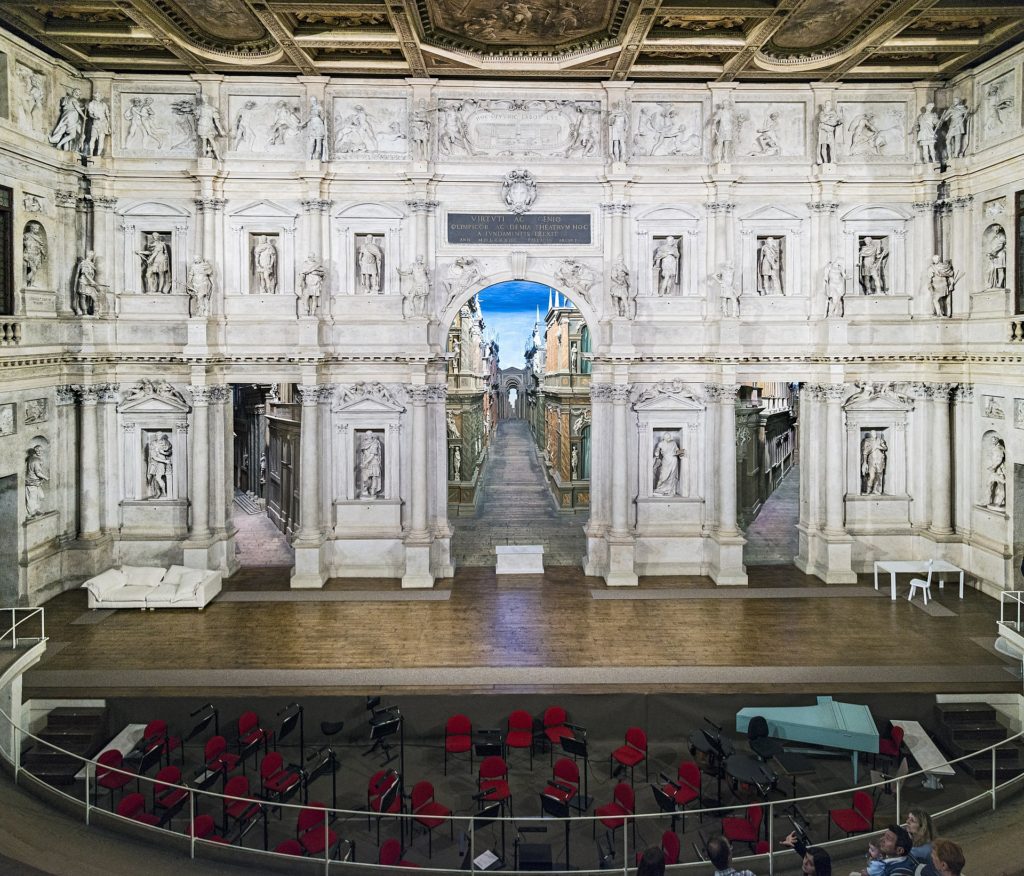
The demand for spectacle drove even more innovation and in 1618 the Teatro Farnese was designed in Parma and had the world’s first proscenium, creating a window around the action, the standard in most theaters today, and it also allowed for scene changes. First used in 1628, it hosted about everything you’d want to share with the 3,000 people you’d invited over for pizza and a beer: drama, opera, and ballet were performed on the stage; equestrian acts and sumptuous balls were held in the large arena between stage and seating—this area could also be flooded to a depth of two feet and used for mock naval battles; and, when not floating little boats, hosted court ceremonies and princely extravaganzas.

Competition heated up across Italy and noble families were quick to put the artists they had on the payroll, including Michelangelo and Da Vinci, to design costumes, scenery, and stage machinery for their private events between the big assignments, like the Sistine Chapel.
The ultimate piece of scene change high tech, the chariot and pole system, hit in 1641. Giacomo Torelli designed a set of slots in the stage floor to set backdrops into that were connected to a set of understage “chariots” on casters to roll them back and forth, all engineered with winches, pulleys and ropes so that scenes could be changed with a single winch. This clever bit of engineering quickly spread all over Europe and was the standard until the end of the 1890s. This technology was more than just pretty—it allowed for the use of specific scenes rather than a general static backdrop—plays could now be written about much more specific places and situations.
Back to the village, in addition to the small gem I talked about at the open, the theater craze hit hard and six theaters were built over the years. According to the director of our local theater, Andrea Merendelli, in 1631 Italy was in the throes of yet another round of the plague, which had killed 10,000 in Florence out of a population of 75,000, and one out of four people in Milan. At that time wooden blockades were put up at the village gates to check health passes that travelers carried to prove they had not been to plague-ridden towns, and to keep anyone suspect out. On February 17, local records show, not only were a troupe of performers admitted to town to put on plays but the wooden planks forming some of the blockades were repurposed to extend a stage. Merendelli assumes that they must have been a well-known troupe for this exception to be made—actors were beginning to be stars during this period and often cannons were shot off to announce their arrival in larger towns.
The main theater in the village is well-used and loved to this day. We’ve been many times to events ranging from a Pink Floyd tribute band (Pink Floyd is huge here) to school plays, to film screenings, to all sorts of performances.

Lola loves evenings at the theater.
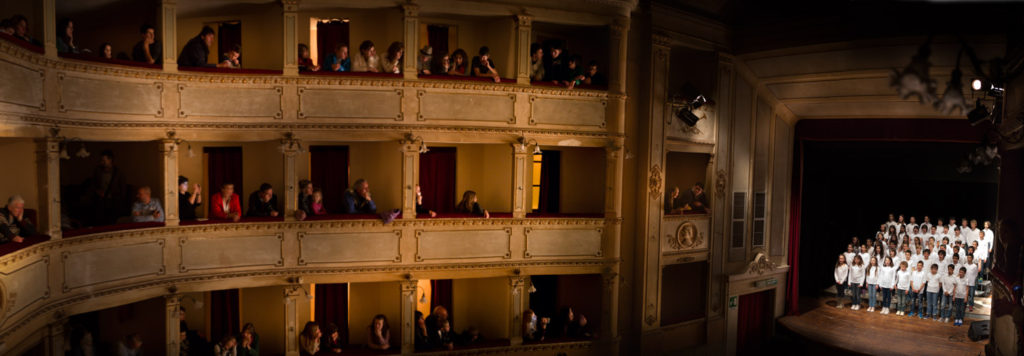
Sebastian’s fifth-grade play packed them in.
Built in 1789 as a part of a grand compound that included a palazzo, a private chapel, and a garden leading to the private theater, the grandness has gone—the garden is now a parking lot and a road through town—but the theater remains as an historical setting for a vibrantly alive local events.
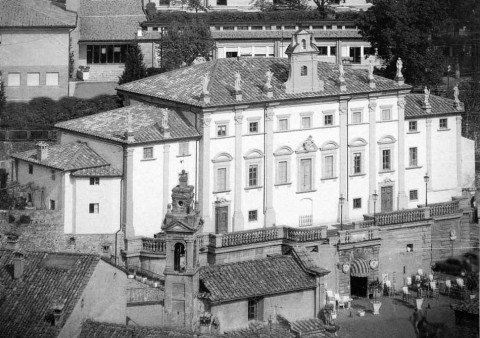
The other four theaters in town did not fare as well. One burned, two were broken up and converted into unrecognizable civic offices. One tiny piazza still hosts events, now mainly musical, as it has since the 1500s. A tunnel leads in from one side in which, during the Renaissance, a large machine was placed to produce an echo.
I had so much fun uncovering all of this and realizing how much the Italian love of spectacle and beautiful spaces, that has been a constant through the centuries, adds to life daily life. I wonder when they were creating these spaces if it ever crossed their minds that villagers would be enjoying them, and making them their own, hundreds of years later. Somehow it seems unlikely that will be the case for most of what we are building today.




